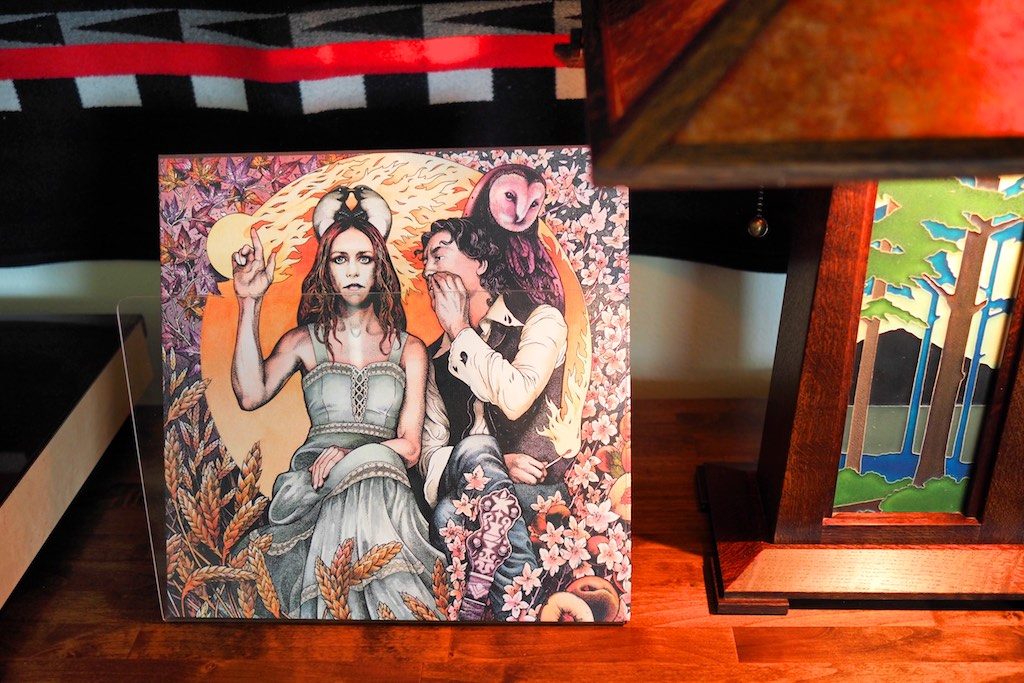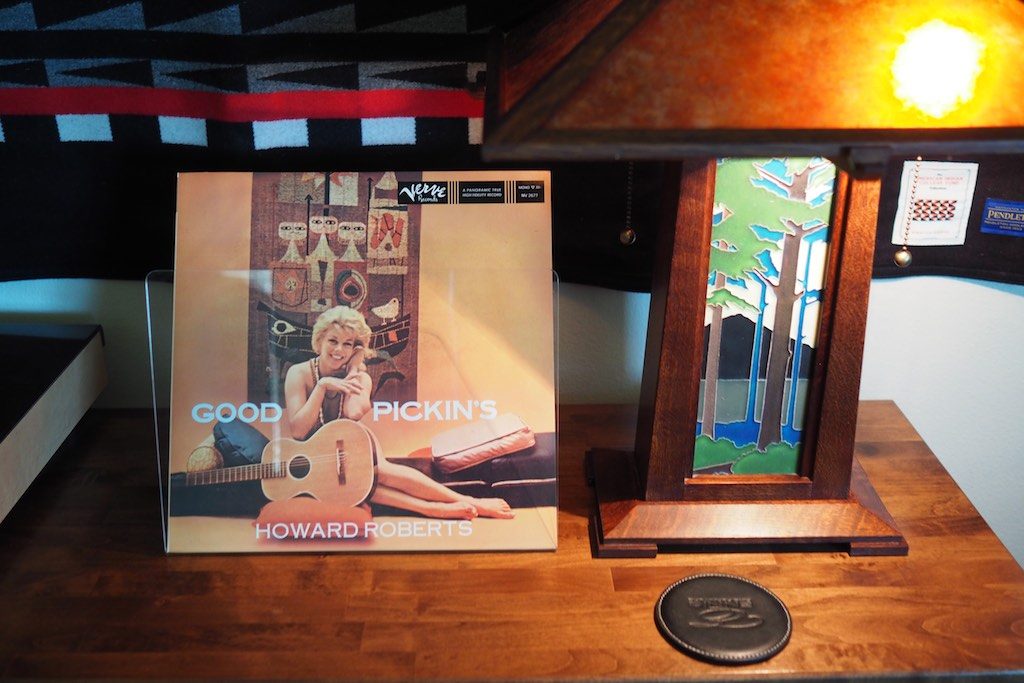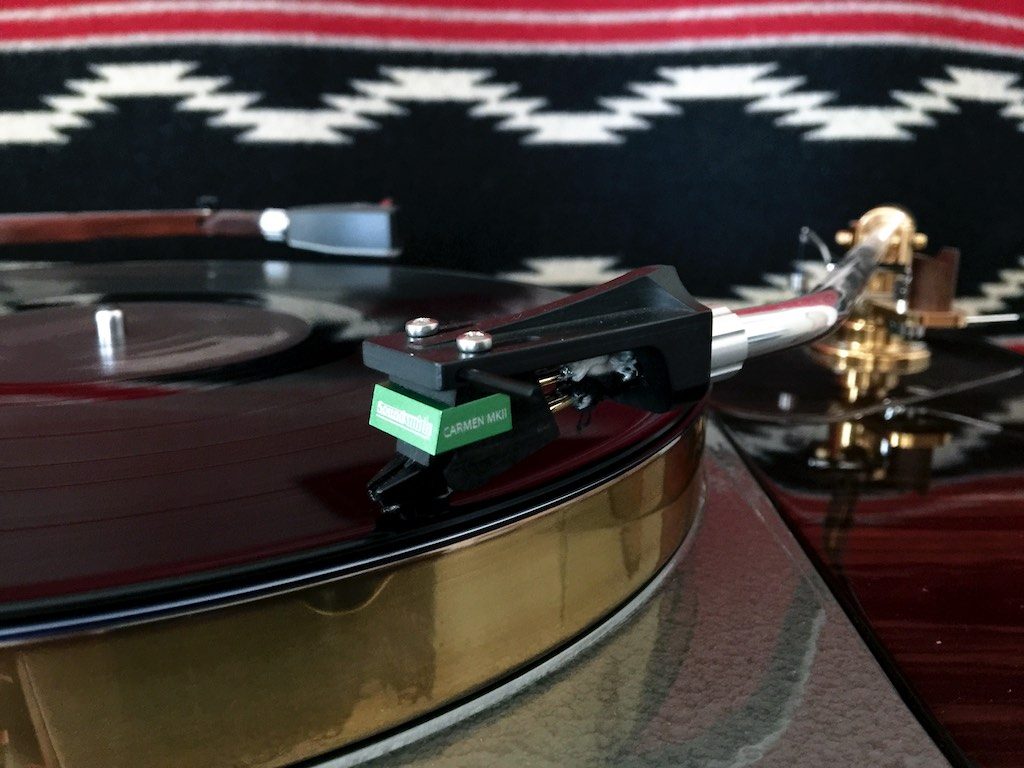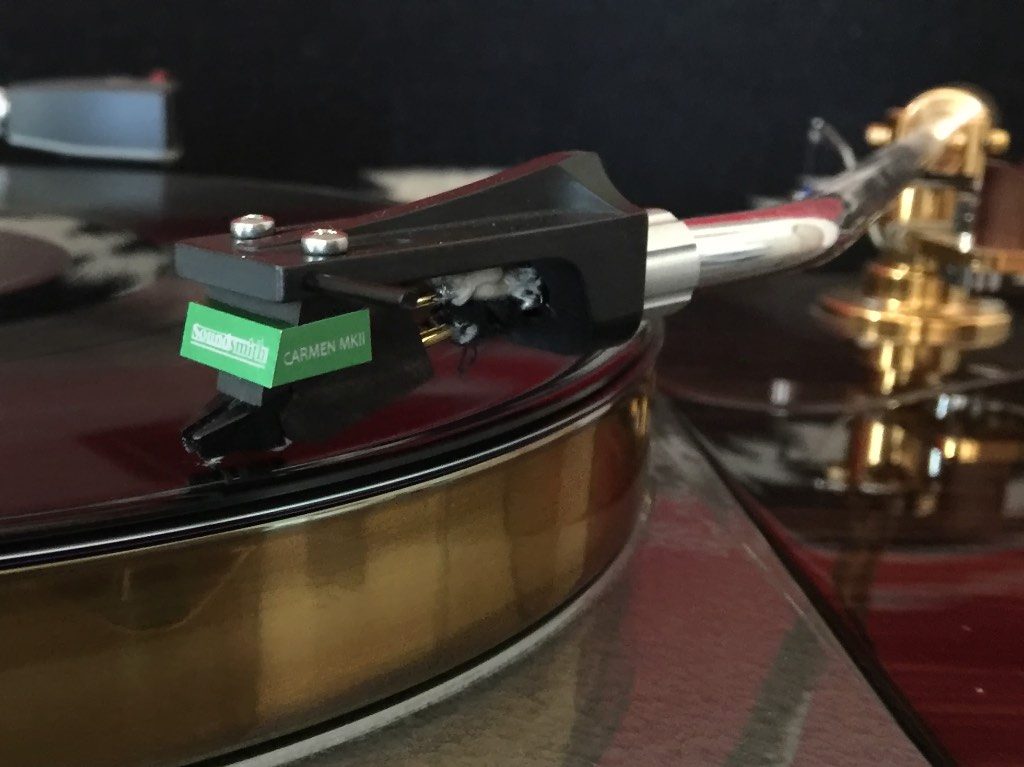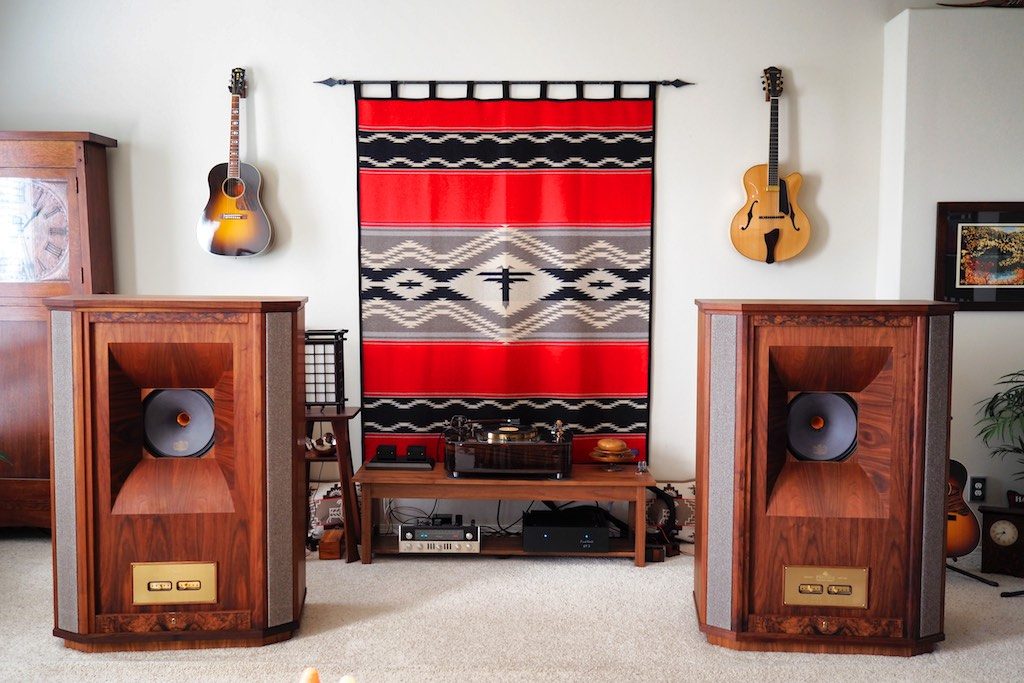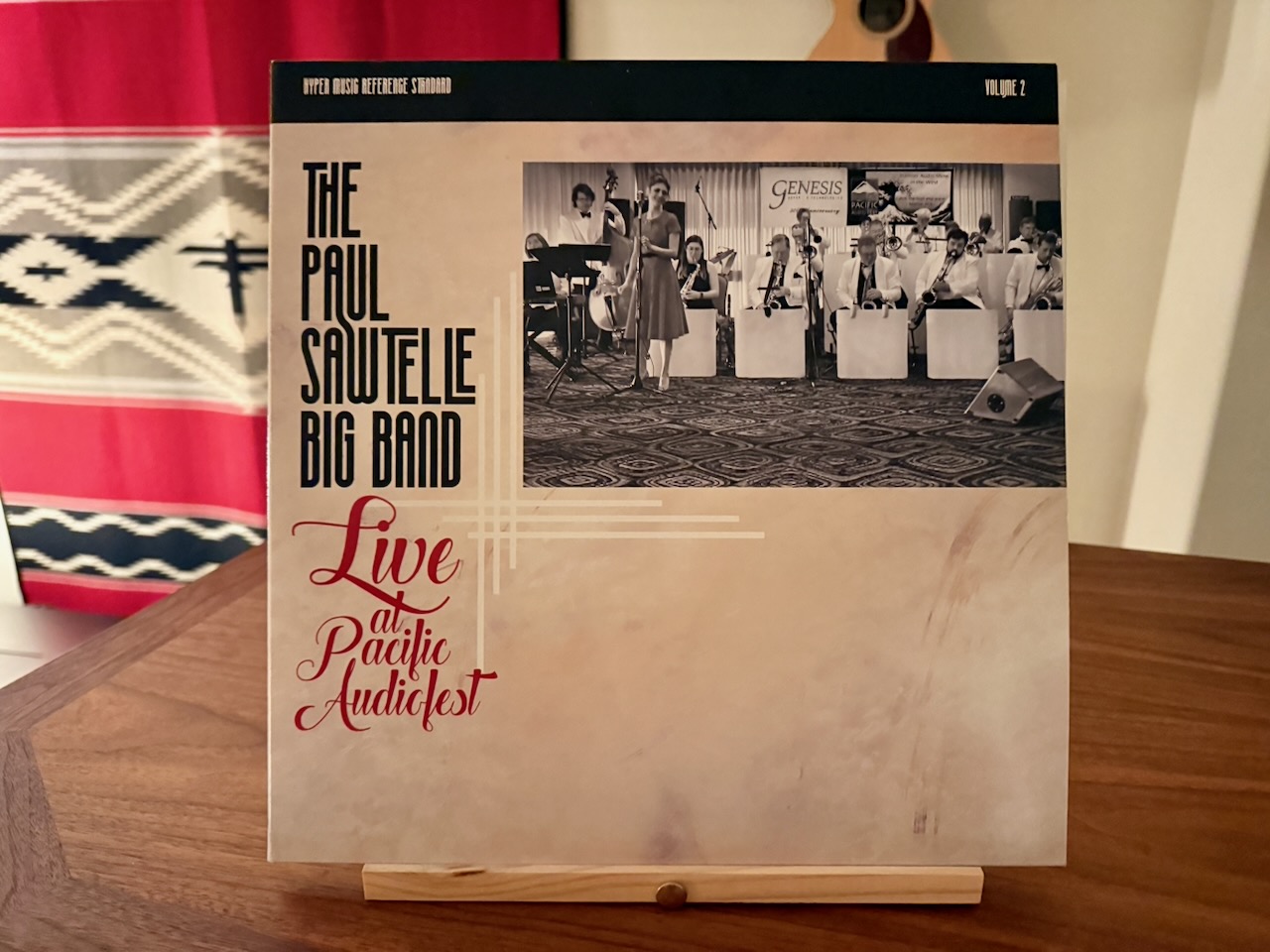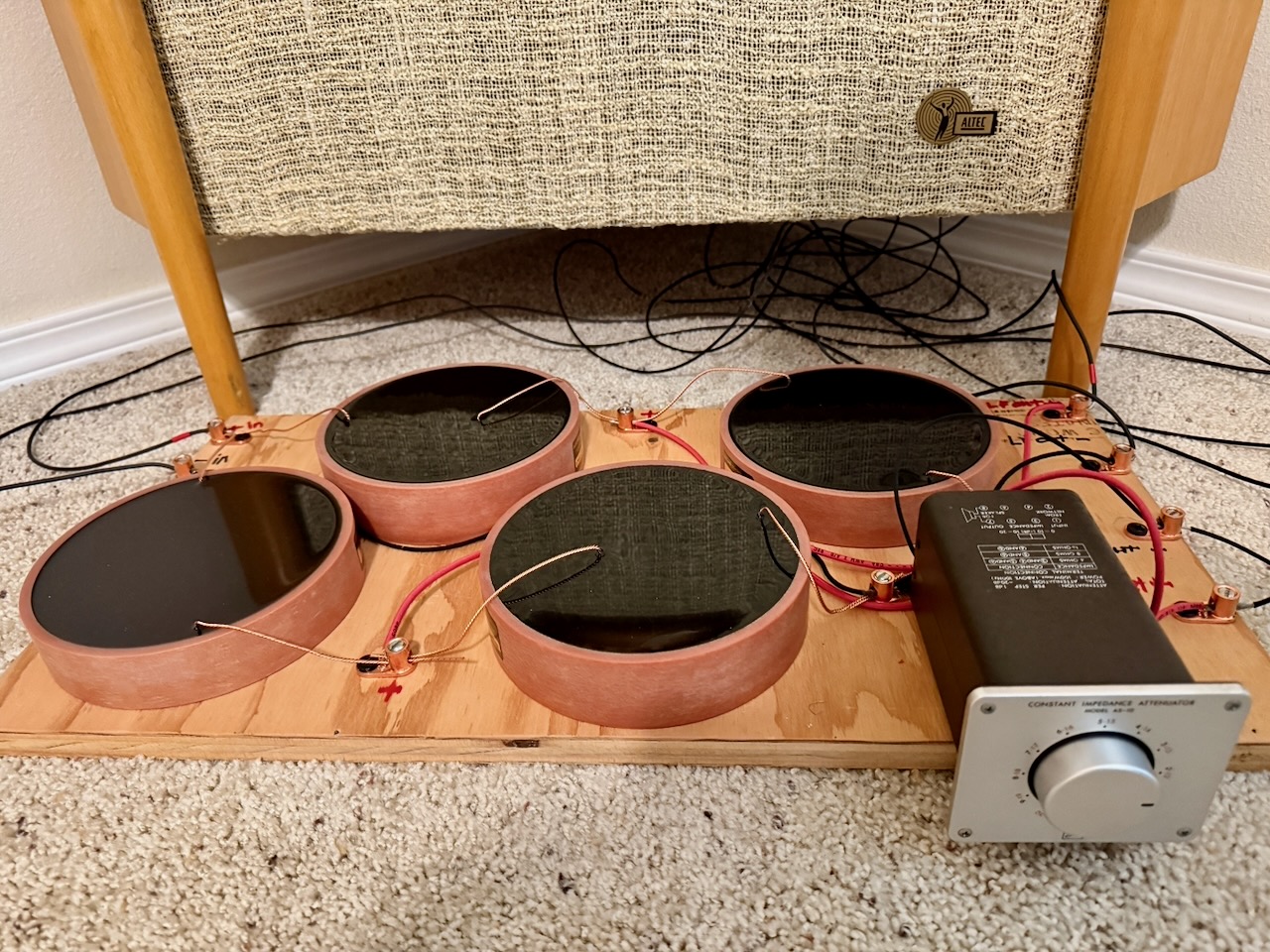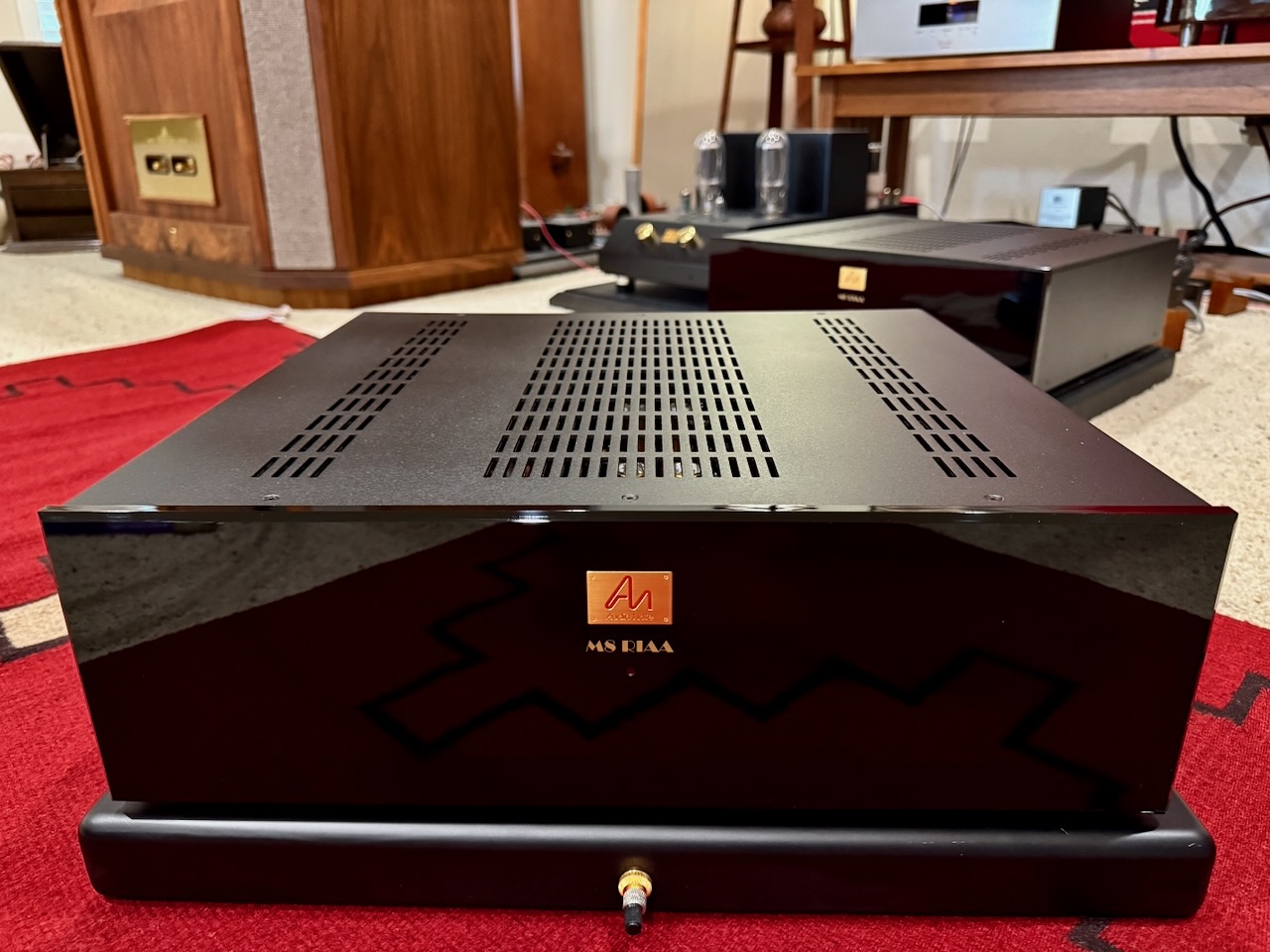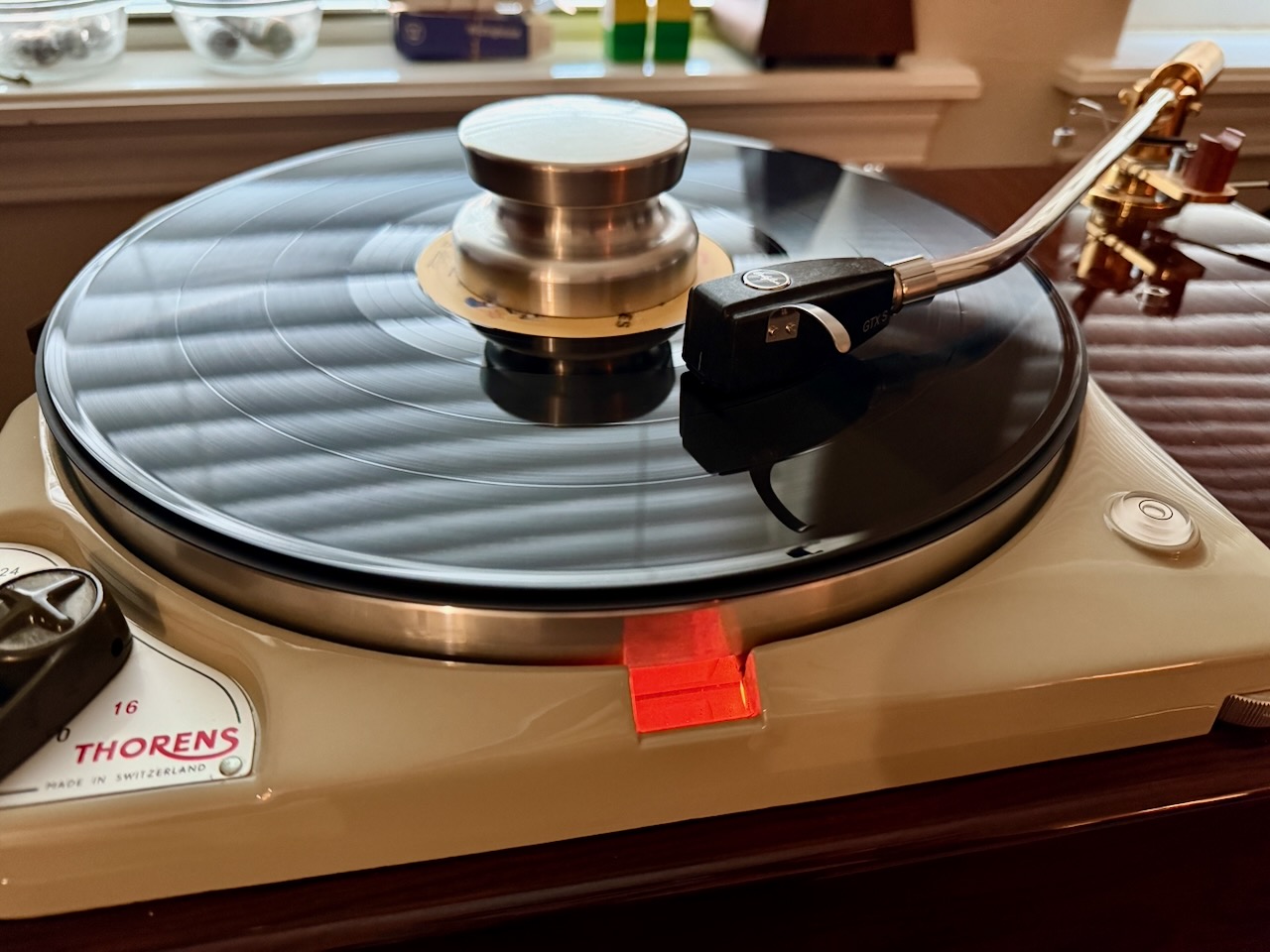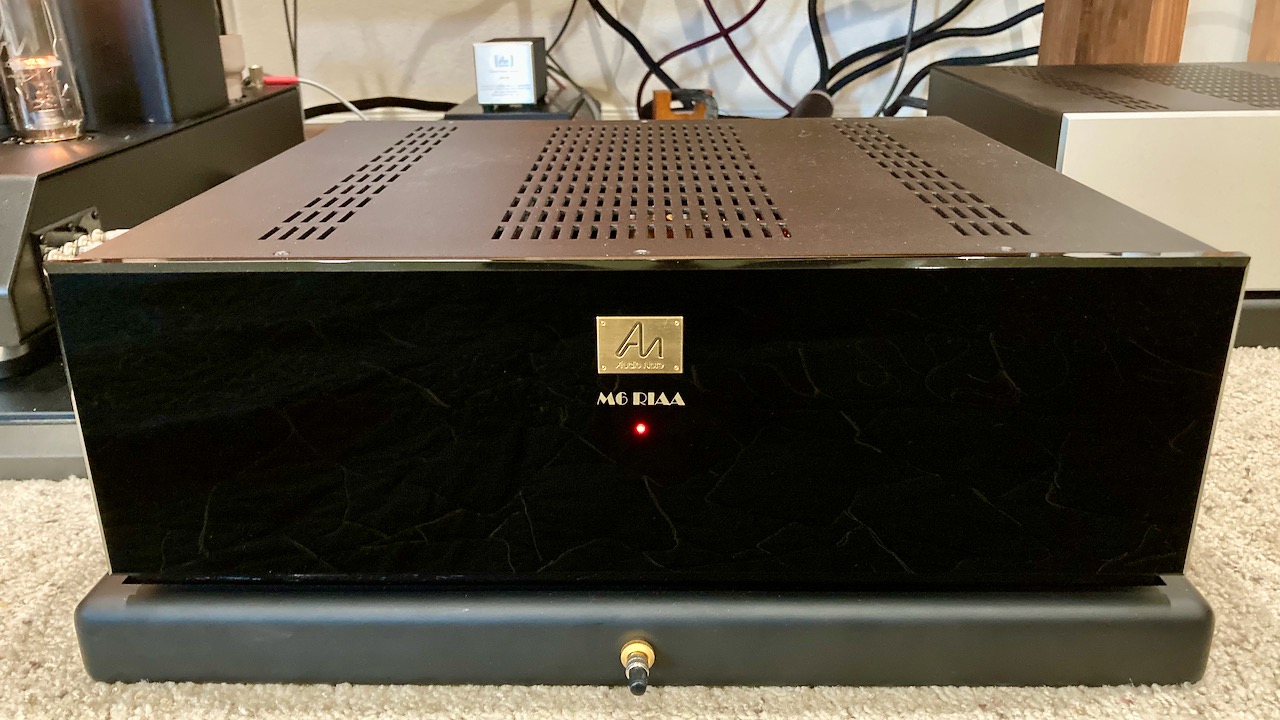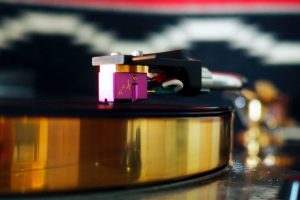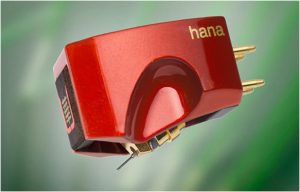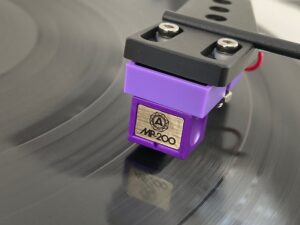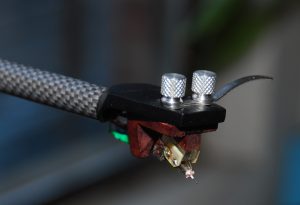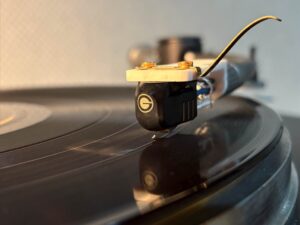The Carmen Mk II was quieter with respect to noise than the SPU, with "blacker" backgrounds, was a little more resolving of instrumental nuance, had a slightly more prominent bass response, provided a little more clarity into the fabric of the music, and displayed a slightly more liquid "flow" as the music unfolded over time.
Both of these cartridges did a beautiful job giving a sense of timbral realism of vocals, piano, guitar, alto sax, and drums, as well as presenting believable tempos, melodic sophistication, subtle dynamic gradations, and easily discernable tone color resolution.
The Carmen Mk II was a little better at playing at live-like volumes while still sounding natural, but overall, I was surprised at how level the playing field was between the two cartridges, and how similar their overall musicality & sonic performance were in this particular system setup.
I loved both these cartridges ability to present an emotionally charged musical performance during listening sessions with Getz/Gilberto, and I came to the conclusion that I could easily live happily with either cartridge.
If you've been desiring the beautiful music making and sonic abilities of an Ortofon SPU but are put off by the high cost of an SPU plus a good step-up transformer to make the SPU sing (not to mention the extra pair of interconnects you'll need to connect everything), I have good news for you, as the Carmen Mk II's performance provides a very "SPU-like" musical & sonic presentation at a fraction of the cost.
I really love Gillian Welch's and David Rawlings album The Harrow & The Harvest (Acony Records, ACNY-1109LP) with their cool vintage instrument musical vibe (1956 Gibson J-50 guitar & 1925 Vega Whyte Laydie banjo, and 1935 Epiphone Olympic archtop, respectively), and with Gillian's knowledge and good taste in recording (Neumann mic's, Studer A800 tape machine, Altec 604 monitors, no compression or EQ, etc.) the result is a gorgeously recorded album to go along with their superb musicianship.
My listening results with the Carmen Mk II and Ortofon SPU were largely a replay of what happened with Getz/Gilberto, where both phono cartridges were beautifully musical and had accomplished sonics that really let me appreciate what stellar musicians Gillian and David are.
The Carmen Mk II is a true music lovers cartridge that easily delivered the emotional connection to the music on The Harrow & The Harvest, and underscored Gillian & David's instrumental & vocal technique and artistry.
Gillian and David have a knack for ballads that get across the vibe of the rural America that I grew up in as a youngster, with all its dark beauty, religiosity intertwined with provincial social issues, and the brooding hopelessness that seems to linger just under the surface these days due to the all too frequent poverty, drug abuse, and alcoholism.
So that's what the Carmen Mk II cartridge had me feeling as I listened, instead of analytically thinking about the usual timbre, tempo, imaging, soundstage, and the like, that I need to do for reviews, the Carmen Mk II just plugged into my feelings, drawing me into Gillian's lyrics, and evoked a strong emotional response as I listened.
The beauty of David's flatpicking, Gillian's rhythm playing, the sorrowful lyrics with their closely harmonized vocals, really came through in abundance. Often listeners don't realize that Gillian's not singing solo, as David's harmony blends in so closely, but it is very apparent with the Carmen Mk II, which makes me appreciate their musicianship even more.
I'll really be looking forward to the day that all of Gillian's and David's albums are released on LP, it'll be quite a treat!
Another album I really enjoy is Rickie Lee Jones' Pop Pop on the Original Recordings Group (ORG 007) label from 2009, mastered by Kevin Gray and Steve Hoffman.
Pop Pop is an excellent recording of mostly old standard jazz songs, featuring an all-star band of Ricke Lee Jones (vocals); April Gay, Arnold McCuller, David Was, Donny Gerrard, and Terry Bradford (backing vocals); Dino Saluzzi (bandoneon); Charlie Haden and John Leftwich (bass); Bob Sheppard (clarinet); Michael Greiner (glass harmonica); Michael O'Neill and Robben Ford (guitar); Michael Greiner (hurdy gurdy); Walfredo Reyes (percussion); Joe Henderson (saxophone); Bob Sheppard (tenor saxophone); Charley Shoemake (vibraphone); and Steve Kindler (violin).
Pop Pop's excellent recording quality and superb mastering really complements Rickie Lee Jones' unique vocal stylizations of these old standards, and the timbral diversity of the instrumentation makes for a really wondrous adventure in listening and identifying instruments.
The Soundsmith Carmen Mk II phonograph cartridge really shows this album off for its luxurious sense of space, vibrant and dramatic image presence, displaying lots of nuance of rich and complex timbral textures, gorgeous overtones, and gave me insights into the articulation of playing and singing styles that I immensely enjoyed.
The Carmen Mk II put the musicians into my living room with an almost spooky "they are here" realism during late night listening sessions, with all kinds of musical nuance adding the allure and intrigue of the music and allowing me to really connect emotionally into the music.
The Carmen Mk II gives Pop Pop's natural sounding high-fidelity recording a live-like intimacy and intensity that I found really enjoyable and captivating and had me marveling at the musicianship of all involved.
The Carmen Mk II's gave timbre, melodies, harmonies, beat, and dynamic gradations a very live-like realism that I really enjoyed, combining both the traditional elements of musicality and audiophile sonics in an artful portrayal of a musical performance that gave me an extremely gratifying listening experience.
The next album I want to talk about is the excellent mono Verve Records Clef Series (MV 2677) Japanese reissue (1980) of Howard Roberts' 1959 Good Pickin's, that was part of "Immortal Jazz on Verve" series.
The album features Red Mitchell (bass), Stan Levey (drums), Howard Roberts (guitar), Pete Jolly (piano), and Tenor Saxophone—Bill Holman (tenor saxophone) playing post-bop / cool jazz in an absolutely superb recording (and remaster) of an excellent musical performance.
Given the mono nature of the Good Pickin's recording there isn't a lot of soundstage width, and the images tend to stack up a little bit in the middle of the soundstage, but the music is absolutely sublime and the overall tone is out of this world, which all comes out in a tour de force performance from the Carmen Mk II.
Even with the images stacking up a bit around the middle of the soundstage, the images were vivid with a lot of presence and displayed a lot of realistically recorded timbral nuance, with the Carmen Mk II phono cartridge.
Through the Carmen Mk II Howard Roberts' guitar playing had beautiful tone and an articulate touch upon the strings, with Bill Homans's tenor sax playing sounding rich, melodious, and gorgeously expressive, and Pete Jolly's piano playing was full of an engaging sparkle and playfulness.
One of the more intriguing songs on Good Pickin's via the Carmen Mk II was the bluesy "Terpsichore" that contained some very realistically recorded double bass playing by Red Michell, being timbrally realistic with lots of forward momentum, demonstrating great pitch definition, and clearly articulated fingering of the strings.
If you can wrap your ears around mono—I hope you can—the Carmen Mk II made this is an eminently enjoyable jazz album that I found utterly engrossing during listening sessions both for its beautiful recorded tonality as well as the impressive musicianship.
Summary & Conclusions
Peter Ledermann's recommendation of his new Soundsmith Carmen Mk II as a phonograph cartridge that met my criteria of a relatively affordable phonograph cartridge ($1000 USD) that is warm, dimensional, musical, and has relatively high output (2.12mV) so you don't have to use an expensive step-up transformer with it to play music, was a superb recommendation that matched my criteria exactly.
I've immensely enjoyed my time listening to the new Carmen Mk II, and I can easily recommend it for its enchanting and music lover friendly blend of live-like musicality and well-balanced audiophile-style sonics, which drew me into the music so easily that I quickly set aside my reviewing mindset and just settled into music listening for the sheer joy of the experience.
The new Soundsmith Carmen Mk II phonograph cartridge's performance in my Altec A5 based system was truly impressive, with a beguiling combination of musicality & sonics that was easily the best performance to date I've heard from vinyl in my A5-based system.
The voicing of the Carmen Mk II is a tad to the warm and lush side, which made it more forgiving of less than stellar recordings and produced a very natural sounding live-like musicality that I found completely addictive.
I found this aspect of the Carmen Mk II's performance to be particularly endearing, as I have quite a few records of great music that aren't that good sounding in audiophile terms and can be somewhat painful to listen to with my usual reference, the Denon DL-103 and Auditorium 23 SUT combo.
While the Carmen Mk II will not fix every issue on every album with an iffy recording, it was flattering to many albums with less than perfect recordings and opened up my record collection to albums that I've found nearly unlistenable in the past.
The Carmen Mk II makes many of those iffy records so musical & enjoyable that I never even thought about their less than perfect nature, as I was enjoying the music so much—quite a magic trick!
The Carmen Mk II was also very transparent and displayed excellent (and natural sounding) live-like levels of resolution. I was not expecting those aspects of the Carmen Mk II's performance, as usually cartridges that are flattering to less well recorded records are not very transparent or resolving, but the Carmen Mk II is, and it is also very quiet with respect to LP surface noise.
To add to that category of "I wasn't expecting this" let me also add the Carmen Mk II's vivid imaging, its presentation of a rich and expansive sense of the recording acoustic, and the excellent soundstaging performance, at least to the extent my vintage A5 could support it in the relatively small room they are in—with width and height being impressive, but depth hindered by the small room.
I'd like to offer a couple of equipment related observations about the Carmen Mk II as well.
While I've been a big fan of the Denon DL-103 and Auditorium 23 SUT combination for many years, the Carmen Mk II pretty much blew it away in every meaningful musical & sonic attribute. No contest.
Additionally, while SUTs can be truly wonderful devices, they can also be fussy regarding inducing hum in my Leben CS-600 and RS-30EQ electronics, and that aspect of sorting out the setup to minimize hum is completely eliminated with the high output of Carmen Mk II, which I really appreciated.
My restored & hot-rodded vintage Altec A5 Voice of the Theatre based system sounds amazing with film soundtracks from television and movies, giving a huge, dynamic, immersive, nuanced, and spookily real performance from pretty much any source I throw at it. While you would expect that kind of film performance from the cinematic heritage of the big Altec A5's, I haven't been able to get that same wondrous film-like performance from my Artisan Fidelity Thorens TD124 Statement turntable until the Carmen Mk II showed up. There is a synergy with the Carmen Mk II and my Artisan Fidelity Thorens TD124 Statement turntable that is truly impressive, elevating it musically and sonically beyond what I've ever heard from it, and giving that same sort of expansive and emotionally gripping performance that I'm used to hearing from video sources in the system.
In my Altec A5 based system, the Carmen Mk II is a high-fidelity music-lovers dream cartridge that excels in delivering a natural sounding and emotionally impactful music listening experience, while at the same time having traits that will endear it to audiophiles, like impressive imaging, a billowing sense of spaciousness, and impressive sound staging abilities.
In my Tannoy Westminster Royal SE based system the Soundsmith Carmen Mk II's performance was pretty much a repeat of what I heard with my Altec A5 Voice of the Theatre system, with a couple of notable exceptions.
The most obvious exception with the Westminster based system was the ability of the Soundsmith Carmen Mk II phonograph cartridge to throw a very wide, spaciously luminous, deeply layered soundstage with holographic like images possessing a live-like presence, something my delightful vintage Altec A5 Voice of the Theatre system isn't capable of in its smallish room with the speakers placed very near the front wall.
The second aspect of the Carmen Mk II's performance that took me completely by surprise was how eerily similar its voicing was (plus the Schick tonearm) to my normal reference of Ortofon SPU Classic GM MkII stereo phono cartridge + Woody SPU tonearm + Intact Audio dual-mono nickel-core SUT + Duelund DCA22GA shielded interconnect combination.
It just never happens when comparing two very different phono cartridges that they perform so similarly musically and sonically, so I was completely surprised by the result!
That's totally a compliment to the Soundsmith Carmen Mk II phonograph cartridge that it can drop into my Westminster based system that is voiced around my reference Ortofon SPU, Woody SPU tonearm, and Intact Audio SUT combination, and have it match it so closely musically and sonically, and at a fraction of the cost.
The overall tonality of the Carmen Mk II was very pure and natural sounding, displaying high levels of timbral realism, realistic timbral textures, oodles of natural sounding musical nuance with overtones, dynamics, harmonies, the sense of touch upon instruments, etc., as well as easily discerned tone colors.
The Carmen Mk II was very adept at displaying the softest to loudest dynamic contrasts, which made melodies, rhythms, and beat very engaging and live-like.
The Carmen Mk II was also very adept at reproducing what felt like live-like tempos, and changes in tempos, giving a sense of speed that was appropriate to the tempos and the music, adding the feeling of exhilaration with faster tempos, and a sense of ease and relaxation with slower tempos, that I found increased the sense of emotional impact I experienced from the music.
Well I suppose I could continue to gush about how much I enjoyed the Soundsmith Carmen Mk II's combination of superb musicality and sonic prowess that allowed every listening session to become a musical oasis, but let me conclude instead by saying that I predict you'll love the Carmen Mk II's way with music, and as such I enthusiastically recommended the Soundsmith Carmen Mk II to you!
I would like to thank Peter Ledermann for his recommendation and loan of his Soundsmith Carmen Mk II phonograph cartridge so I could write about it for you here at Positive Feedback, and I am delighted as I now have an affordable, warm, dimensional, musical, and relatively high output phonograph cartridge that I can easily recommend to music lovers everywhere!
As always, thanks for stopping by Positive Feedback to read this article, and may the tone be with you!
Contact Information
You can contact Peter Ledermann to arrange for the purchase of a Soundsmith Carmen Mk II phonograph cartridge of your very own HERE.
You can visit the Soundsmith website to learn more about the Carmen Mk II HERE.





